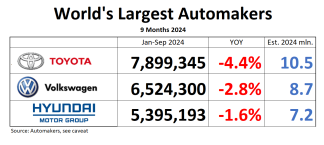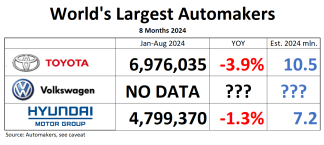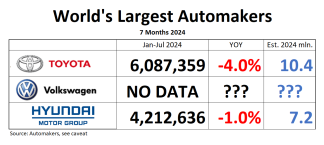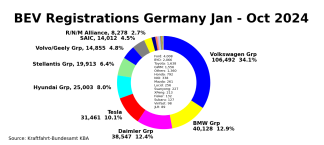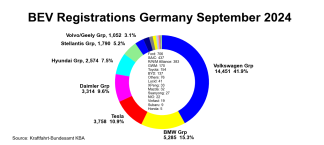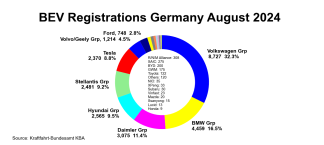Stepping up the pace in its quest for world domination, Volkswagen will pour €85.6 billion ($106 billion) into “new models, technologies and production facilities in the coming five years,” the Wolfsburg carmaker said today in a press release. VW also made no bones of its objective “to become the leading automotive group in both ecological and economic terms.”
Volkswagen announced years ago its intention to become the world’s largest, greenest, and most profitable carmaker by 2018. The world’s largest already is within reach, also because world leader Toyota stubbornly refuses to grow. In a strategy completely opposed to that of VW, Toyota has announced again and again that it won’t build new car factories until 2016 at least.
| World’s Largest Automakers | ||||
| 9 Month 2014 | ||||
| Jan-Sep 2014 | Jan-Sep 2013 | YoY | 2014 proj. | |
| Toyota | 7,734,667 | 7,536,260 | 2.6% | 10,313,000 |
| Volkswagen | 7,400,000 | 7,030,000 | 5.9% | 10,092,000 |
| GM | 7,371,743 | 7,250,764 | 1.7% | 9,829,000 |
| Source: Company data. GM, VW: Deliveries. Toyota: Production. Blue: Estimate | ||||
| Volkswagen data ex MAN and Scania. Included in estimate | ||||
In the Daily Kanban’s tally of the world’s largest carmakers, Volkswagen ranks second behind Toyota, General Motors is third. This is how the year is believed to end – unless Volkswagen makes a surprise announcement. In 2015 however, Volkswagen has a very good chance to take the top spot.
Over the next 5 years, Volkswagen plan to dump €64.3 billion ($80 billion) into property, plant and equipment, investment property and intangible assets, and €21.9 billion ($27.2 billion) into R&D. More than half of the capex (around 56 percent) will be spent in Germany. €41.3 billion ($51.3) will go into modernizing and extending the product range in Volkswagen Group’s panoply of brands. Across all brands, Volkswagen wants launch more than 100 new or refreshed vehicles this year and next. Volkswagen’s joint ventures in China are not consolidated and are not included in the above figures. Between 2015 to 2019, the Chinese JVs will invest a total of €22.0 billion ($27.3 billion) in new production facilities and products.
Toyota appears to be worried of an impending recession, qualms Volkswagen does not seem to have. Toyota has said again and again that it does not want to be caught with its pants down and new factories up when the economy turns nasty, as it was when the sky was falling in 2008.

